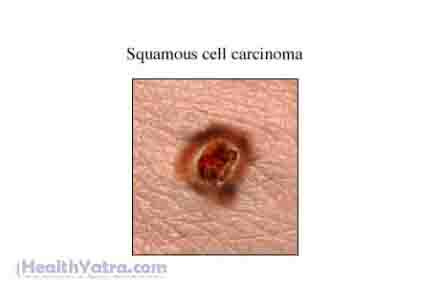Definition
Squamous cell carcinoma is a form of skin cancer. It is the second most common form of skin cancer.
The cancer develops in the uppermost layer of skin cells. Squamous cell carcinoma usually grows slowly. It is rarely fatal if treated early. However, the cancer can be lethal if it spreads beyond the skin.

Causes
Cancer occurs when cells in the body divide without control or order. Eventually these uncontrolled cells form a growth or tumor. The growths invade and take over nearby tissue. It is not clear exactly what causes these problems in the cells but is probably a combination of genetics and environment.
Risk Factors
Areas of skin that are damaged have higher risk of cancer. Skin that is regularly exposed to the sun is most likely to develop skin cancer. Squamous cell carcinoma may also develop in skin that has scars, burns, or exposure to chemicals or radiation.
Factors that increase your risk of developing squamous cell carcinoma include:
- Increasing age
- Blonde or red hair
- Blue or green eyes
- Childhood sunburns, freckling, or long periods of sun exposure
- Fair skin that rarely tans
- A family history of skin cancer
- A personal history of skin cancer
- Treatment that suppresses the immune system, such as such as having an organ transplant
- History of radiation or ultraviolet light treatment
- Frequent use of tanning beds
- Exposure to cancer causing chemical such as arsenic, tar, or some insecticides
- Being a smoker
- Past infection with human papillomavirus (HPV)
Symptoms
Symptoms include:
- A raised red patch that is scaly or rough
- A raised patch of skin that may appear to have horn-like rough edges
- In color, the patch may be reddish, pink, flesh-colored, or reddish-brown
- A long-standing sore that will not heal with simple at-home treatment
Diagnosis
Your doctor will ask about your symptoms and medical history. A physical exam will be done.
The doctor will look at the skin growth. A sample of the growth will be taken and examined for cancer cells. This examine will help determine the stage and type of the cancer. Your doctor will use this information to guide treatment and make a prognosis.
Treatment
Talk with your doctor about the best treatment plan for you. Options include:
- Mohs micrographic surgery—microscopic surgery that offers the best cure rate for squamous cell carcinoma
- Removing the growth with simple surgery
- Plastic surgery to repair any cosmetic problems that occur after treatment
For people who are not able to have surgery, other treatment options include:
- Freezing the growth off with liquid nitrogen
- Laser treatment
- Radiation therapy
- Photodynamic therapy in which the cells absorb an acid that causes them to die when exposed to light
- Creams, especially fluorouracil or imiquimod
Prevention
To reduce your chances of getting squamous cell carcinoma, take these steps:
- Reduce your exposure to the sun. Wear sunscreen, long sleeves and slacks, and hats.
- Stay out of the sun during the midday hours.
- UV light is stronger at higher elevations. If you ski or do other winter sports, wear sunscreen.
- At-risk adults should examine themselves monthly. They should also get an regular full-body exams by a dermatologist. The doctor will check for moles, freckles, and other growths.
- Limit how much time your child spends in the sun. Discourage your child from tanning.
